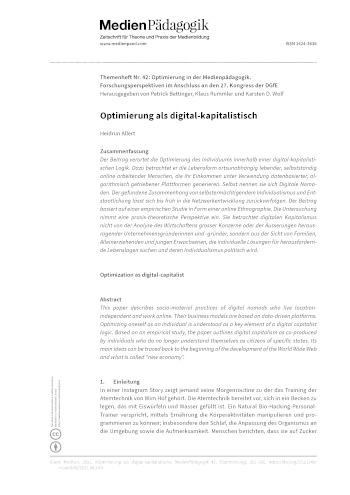Abstract
This paper describes socio-material practices of digital nomads who live location-independent and work online. Their business models are based on data-driven platforms. Optimizing oneself as an individual is understood as a key element of a digital capitalist logic. Based on an empirical study, the paper outlines digital capitalism as co-produced by individuals who do no longer understand themselves as citizens of specific states. Its main ideas can be traced back to the beginning of the development of the World Wide Web and what is called “new economy”.
References
Gerard, David. 2017. Attack of the 50 Foot Blockchain: Bitcoin, Blockchain, Etherium and Smart Contracts. First edition. London, England: David Gerard.
Göttlich, Udo. 2010. «Der Alltag der Mediatisierung: Eine Skizze zu den praxistheoretischen Herausforderungen der Mediatisierung des kommunikativen Handelns». In Die Mediatisierung der Alltagswelt, herausgegeben von Maren Hartmann und Andreas Hepp, 23–34. Wiesbaden: VS Verlag für Sozialwissenschaften. https://doi.org/10.1007/978-3-531-92014-6_2.
Hörning, Karl Heinz. 2001. Experten des Alltags. Die Wiederentdeckung des praktischen Wissens. Weilerwist: Velbrück Wissenschaft.
Hörning, Karl H. 2004. «Soziale Praxis zwischen Beharrung und Neuschöpfung. Ein Erkenntnis- und Theorieproblem». In Doing Culture: Neue Positionen zum Verhältnis von Kultur und sozialer Praxis, herausgegeben von Karl H. Hörning und Julia Reuter, 19–39. Bielefeld: transcript Verlag. https://doi.org/10.14361/9783839402436-002.
Kiyosaki, Robert T. 2014. Rich Dad Poor Dad: Was die Reichen ihren Kindern über Geld beibringen. FinanzBuch Verlag.
Kühl, Stefan. 2000. Das Regenmacher-Phänomen. Widersprüche und Aberglauben im Konzept der lernenden Organisation. Campus: Frankfurt a.M.
Möller, Christian. 2019. Kommunikationsfreiheit im Internet: Das UN Internet Governance Forum und die Meinungsfreiheit. Heidelberg: Springer VS. https://doi.org/10.1007/978-3-658-27482-5.
Morozov, Evgeny. 2013. To Save Everything, Click Here: The Folly of Technological Solutionism. 1. ed. New York, NY: PublicAffairs.
Nachtwey, Oliver, und Timo Seidl. 2017. Die Ethik der Solution und der Geist des digitalen Kapitalismus (IFS Working Paper11). Institut für Sozialforschung. http://www.ifs.uni-frankfurt.de/wp-content/uploads/IfS-WP-11.pdf.
Turner, Fred. 2006. From counterculture to cyberculture: Stewart Brand, the Whole Earth Network, and the rise of digital utopianism. Chicago: University of Chicago Press.
Schatzki, Theodore R. 2012. «A Primer on Practices». In Practice-Based Education. Practice, Education, Work and Society, herausgegeben von Joy Higgs, Ronald Barnett, Stephen Billett, Maggie Hutchings, und Franziska Trede, 6:13–26. Rotterdam: SensePublishers. https://doi.org/10.1007/978-94-6209-128-3_2.
Seele, Peter. 2020. «Greift Google das Hochschulsystem an? Zur Zukunft der Universitäten in Zeiten von KI und Digital-Monopolen, Corona und Home Office». Forschung und Lehre, DHV, 27. Jahrgang. https://www.wissenschaftsmanagement-online.de/beitrag/greift-google-das-hochschulsystem-zur-zukunft-der-universit-ten-zeiten-von-ki-und-digital-11499.
Shaffer, David W. 2006. «Epistemic Frames for Epistemic Games». Computers & Education 46 (3): 223–34. https://doi.org/10.1016/j.compedu.2005.11.003.
Sollfrank, Cornelia, Hrsg. 2018. Die schönen Kriegerinnen: technofeministische Praxis im 21. Jahrhundert. Wien: Transversal Texts. https://transversal.at/media/femtec_CmBUyFV.pdf.
Sollfrank, Cornelia, Felix Stalder, und Shusha Niederberger, Hrsg. 2021. Aesthetics of the Commons. Bd. 24. The Institute For Contemporary Art Research Series, Zurich University Of The Arts. Zürich: Diaphanes. http://diaphanes.net/titel/aesthetics-of-the-commons-6419.
Staab, Phillip. 2019. Digitaler Kapitalismus: Markt und Herrschaft in der Ökonomie der Unknappheit. Berlin: Suhrkamp.
Volkart, Yvonne. 2018. «Techno-Öko-Feminismus. Unmenschliche Empfindungen in technoplanetarischen Schichten». In Die schönen Kriegerinnen: technofeministische Praxis im 21. Jahrhundert, herausgegeben von Cornelia Sollfrank, 167–202. Wien: Transversal Texts. https://transversal.at/media/femtec_CmBUyFV.pdf.
Zuboff, Shoshana. 2019. «Surveillance Capitalism and the Challenge of Collective Action». New Labor Forum 28(1): 10–29. https://doi.org/10.1177/1095796018819461.

